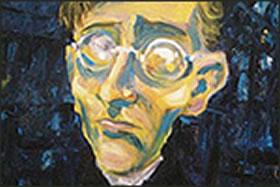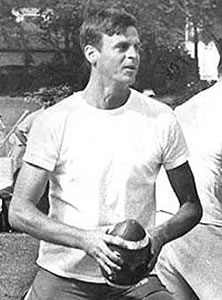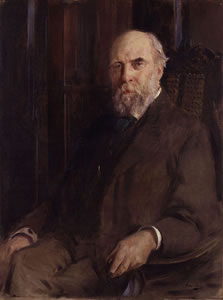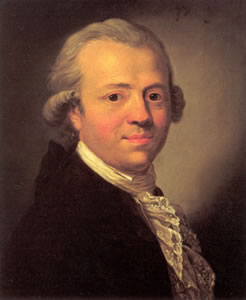De Duitse dichter en schrijver Walter Rheiner (eig. Walter Heinrich Schnorrenberg) werd geboren op 18 maart 1895 in Keulen. Zie ook mijn blog van 18 maart 2009.
Köln
Ich komme am Dom vorbei. Der steht da – unersättlich, mit der großen
in die Nacht hineingreifenden Gebärde –
Kleine weiche Kokotten stehen im Schatten der Häuser und haben jenes
mir ach so bekannte Zucken um den Mund, wenn ein großer gedunsener
Mann auf sie zutappt und mit breiten Froschfingern ihre kleine Brust betastet.
Und ich stehe auf dem Bahnhof.
Da liegt der braune Zug in den Gleisen, der nachts seine Not
von London über Ostende, Berlin und Warschau nach Moskau heult,
atmend wie ein gepeinigtes Tier.
Und ich weiß: –
Um diese Zeit sinken schwere Wolken von Schnee tief in die kanadischen Wälder;
um diese Zeit wälzt sich ein kranker, müder Krake auf dem Meeresgrund
dem Tode zu;
um diese Zeit bröckelt wieder eine zermorschte Landschaft von dem greisen
Monde ab. —
Und ich weiß: –
Ich empfinde das alles: das tiefe Elend, in dem ich liege, das helle Glück,
zu dem ich fliege in anderen Stunden;
in mir ist die Angst des Bibers; der Hunger des Kängurus, das unter südlichen
Sternen einsam auf flüsternden Steppen springt; meine Seele ist ein Zwinger
voll wilder Tiere, voll lauernder, boshafter Affen und nagender Hyänen;
und ich bin machtlos, arm; ich falle vor ihr nieder wie ein nackter Wilder,
der im heißen Dunst und Dunkel brütender Sümpfe die Kugelblitze um
den Kilimandscharo rollen hört; –
und doch weine ich und lache und singe mit zersprungenen Lippen;
und mein Herz glüht wie eine Perle, und meine Augen sind Diamanten: –
Meine Welt! Meine tanzende, große Welt!

Walter Rheiner (18 maart 1895 – 12 juni 1925)
Portret door Manfred W. Jürgens
De Sloveense dichter en schrijver Srečko Kosove werd geboren in Sežana op 18 maart 1904. Zie ook mijn blog van 18 maart 2009.
A Face By The Window
I love you, the grey face in the grey
window of the coffee house – the face
with expectations.-
In the age of broken spears, ships,
masts – the heart full of
arrows – grey apathy in the eyes,
you would know: It spills
over us like a cascade of light
from the sky.
We will be able to look at
the swaying of the green seas
and see terrifying whirlpools,
sailors on masts,
without nervousnes.
The Sun Laughs
The sun laughs at the dead
You
with burning cheeks
and with hearts burning,
with fervent lips
chanting
to holy Righteousness.
Rigid ascetics
in blue coats,
with a thought firmly
fixed upon the future
and with resignation
in black eyes.
I am luxury.
Vertaald door Katarina Jerin

Srečko Kosovel (18 maart 1904 – 27 mei 1926)
Monument in Triëst
De Franse schrijver Jean Anglade werd geboren op 18 maart 1915 in Bonnets bij Thiers. Zie ook mijn blog van 18 maart 2009.
Uit: Les Bons Dieux
“Décidément, les Saton ont pris goût aux nouveautés! A peine soixante-quinze ans après s’être mis à faire des couteaux, voici qu’ils décident à leur tour de fonder une entente pareille à celle des Bonnet-Lavest. Ils y ont tout de même réfléchi près de huit siècles. Elle associe un grand-père, trois frères, deux beaux-frères, deux cousins, sans compter les femmes, enfants et autre menu bétail. Mais une ordonnance exige à présent un acte écrit prouvant l’établissement de toute société possédant plus de cent livres de capital. Les nouveaux parsonniers doivent se rendre donc à Vollore chez Jean Ferrand, notaire royal et arpenteur juré, afin de coucher noir sur blanc la surface et les limites de leurs terres, bois et prairies, la substance et la valeur du cheptel mort et vif, l’inventaire du mobilier et des ustensiles, le montant de l’argent liquide disponible. Ils s’engagent à exploiter en communauté tous ces biens, et autant l’un comme l’autre en tous et chacun ses meubles et immeubles, et même héritages, passés, présents et à venir en quelque pays et province qu’ils soient situés et assis, sans aucune chose se réserver en propre ni tenir l’un plus que l’autre. Ils notent enfin qu’ils ont élu maître et maîtresse Josion, le grand-père Saton, et Louise Cathonnet sa petite-nièce par alliance. La fondation amène pendant six mois beaucoup de grabuge dans le village, mais enfin tout finit par trouver sa juste place, les maisons, les bêtes et le monde. Cette responsabilité écrite d’un homme et d’une femme sur les travaux, le domestique et les moeurs s’avère une excellente chose : elle contribue à assagir les Saton, naguère réputés pour leur turbulence. Et en effet les relations entre les deux communautés voisines deviennent amicales.”

Jean Anglade (Bonnets, 18 maart 1915)
De Amerikaanse schrijver George Ames Plimpton werd geboren op 18 maart 1927 in New York. Zie ook mijn blog van 18 maart 2009.
Uit: Truman Capote
“Truman must have kept at his guest list all that summer, pruning, adding, mostly pruning, I suspect. I remember summer day at the Bennett Cerfs’ in Mount Kisco — the estate called the Columns because the money to build it had come the proceeds Bennett got for his syndicated columns — “Tradewinds,” “Cerfboard” among them. It was a hot day and I remember the luncheon guests gathered around the swimming pool that afternoon — Frank Sinatra, Mia, his young wife then, and Truman of course. Mia in a black bathing suit, as I remember, was lying on her back in the sun by the edge of the pool — just enchanting, and not really part of the conversation or anything, when suddenly a butterfly landed on the exposed part of her breast, above the line of the bathing suit. It was one of the large swallowtail variety, the kind that fans its wings absolutely straight up and holds them there motionless, a sail for an instant, and then fans them again. Absolutely beautiful, of course, obviously because it had picked Mia to land on, faunlike, childlike, and we all stared spellbound. Then Truman broke it, quite abruptly. “What about the Goetzes?” he called out quite loudly, or some such name. “Should I invite them, or consign them…”

George Plimpton (18 maart 1927 – 25 september 2003)
De Amerikaanse romancier Richard Thomas Condon werd geboren op 18 maart 1915 in New York. Zie ook mijn blog van 18 maart 2007 en ook mijn blog van 18 maart 2009.
Uit: The Manchurian Candidate
“We know. We read all about it and let me say with all my heart I got left that I am as proud of you, even though I never met you, as if it were Eddie, my own kid. My son.”
“Mr. Mavole,” Raymond said rapidly, “I thought that if it was O.K. with you maybe I could stop over in St. Louis on my way to Washington, you know? I thought, I mean it occurred to me that you and Mrs. Mavole might get some kind of peace out of it, some kind of relief, if we talked a little bit. About Eddie. You know? I mean I thought that was the least I could do.”
There was a silence. Then Mr. Mavole began to make a lot of slobbering sounds so Raymond said roughly that he would wire when he knew what flight he would be on and he hung up the phone and felt like an idiot. Like an angry man with a cane who pokes a hole through the floor of heaven and is scalded by the joy that pours down upon him, Raymond had a capacity for using satisfactions against himself.
When he got off the plane at St. Louis airport he felt like running. He decided Mavole’s father must be that midget with the eyeglasses like milk-bottle bottoms who was enjoying sweating so much. The man would be all over him like a charging elk in a minute. “Hold it! Hold it!” the pimply press photographer said loudly.
“Put it down,” Raymond snarled in a voice which was even more unpleasant than his normal voice. All at once the photographer was less sure of himself. “Whassa matter?” he asked in bewilderment – because he lived at a time when only sex criminals and dope peddlers tried to refuse to have their pictures taken by the press.
“I flew all the way in here to see Ed Mavole’s father,” Raymond said, despising himself for throwing up such corn. “You want a picture, go find him, because you ain’t gonna take one of me without he’s in it.”

Richard Condon (18 maart 1915 – 9 april 1996)
De Engelse dichter en kunstcriticus William Cosmo Monkhouse werd geboren op 18 maart 1840 in Londen. Zie ook mijn blog van 18 maart 2009.
Song
Who calls me bold because I won my love,
And did not pine,
And waste my life with secret pain, but strove
To make him mine?
I us’d no arts; ’t was Nature’s self that taught
My eye to speak,
And bid the burning blush to paint unsought
My flashing cheek;
That made my voice to tremble when I bid
My love “Goodby,”
So weak that every other sound was hid,
Except a sigh.
Oh, was it wrong to use the truth I knew,
That hearts are mov’d,
And spring warm-struck with life and love anew,
By being lov’d?
One night there came a tear, that, big and loth,
Stole ’neath my brow.
’T was thus I won my heart’s own heart, and both
Are happy now.

Portret door John McLure Hamilton
De Duitse schrijver Friedrich Nicolai werd geboren op 18 maart 1733 in Berlijn. Zie ook mijn blog van 18 maart 2009.
Uit: Freuden des jungen Werthers
“«‘s, der Henker hol’ ’n Buch, ‹ Die Leiden des jungen Werthers›», sagte Hanns, «‘s dringt dir durch Mark und Bein, jede Ader schwillt dir, und’s Gehirn funkelt dir, daß du gleich auf möchtest…»
«Ja freilich, ’s so ein Buch», sagte Martin, «wer’s geschrieben hat, kann sich ruhig aufs Haupt legen und fürchten nicht, daß über hundert Jahr ’n belesner Tölpel davon schwatze: “s ist euch ein rar Buch, ihr Leute, seit neunundneunzig Jahren hat kein Mensch davon was gehört und gesehn.»
Hanns war einundzwanzig Jahr alt und Martin zweiundvierzig.
Hanns fuhr fort: «Was das für ’n Junge war, der Werther. Gut, edel, stark. Und wie sie’n verkannt haben. Da kamen die Schmeißfliegen, setzten sich auf ‘n, beschmitzten alles, was er tat. Und auch Albert, sein Freund, verkannt ‘n, konnt’ eifersüchtig werden. Ach, was hat der Albert nicht auf sich! Möcht nit Albert sein, um aller Welt Güter nit!»
M.: Du nicht Albert? Hör, Hanns, du tätst ’n großen Sprung, wenn du Albert würdst. War Albert nicht der redlichste, unbescholtenste, nützlichste Mann, der Lotten von ganzer Seele liebte? Sollt’ er etwan ganz geruhig zusehen, daß ein andrer bei seiner Frau den sterblich Verliebten spielte, ihr den Kopf umkehrte und sie in der Leute Mäuler brächte? Was hat denn wohl Albert getan, warum du nicht Albert sein möchtest?
H.: ‘s ja ’n Greuel, hast nicht gelesen, wie ‘r eifersüchtig war, wie ‘r Lotten spitze Reden gab, als er den armen Werther in aller Unschuld bei ‘r fand?“

Friedrich Nicolai (18 maart 1733 – 8 januari 1811)
